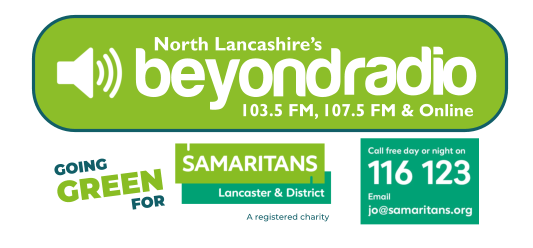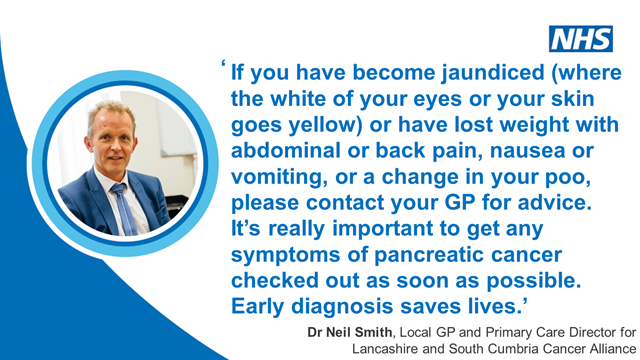Beyond Radio Health

SAMARITANS - Here for you 24/7
Beyond Radio are showing their support for Samaritans (Lancaster & District) this Christmas - we want you to know, that there's always someone to talk to.
Suicide is the biggest killer of men under the age of 45. No matter what might be going on in your life, there is always someone that wants to listen.
You can call Samaritans, for free, at any time, on 116 123 or you can email jo@samaritans.org
You can also help the Lancaster Samaritans by donating. To donate four pounds, text FOUR to 70450. Texts will cost £4 plus your standard message rate and you need to get the bill payers permission.
Lung Cancer Campaign Launched
During the coronavirus pandemic we became a nation of DIYers spending more time looking after our homes and gardens.
But according to new research were spending more time looking after our homes than ourselves with many of us saying fixing a broken washing machine is a priority than getting symptoms such as a cough checked out.
A new campaign called Do it For Yourself has been launched to raise awareness that a cough lasting more than three weeks could be a sign of lung cancer and to encourage people not to delay and contact their GP if they think anything is wrong.
LISTEN:
Short Interview:
Full Interview:
November is Pancreatic Cancer Awareness Month
Almost 10,000 people are newly diagnosed with pancreatic cancer each year in the UK. The disease affects men and women equally, with incidence increasing from the age of 45. The average age at diagnosis is 72.
Pancreatic Cancer Awareness Month’s goal is to bring much-needed focus and attention to the disease, especially the need for increased awareness of cancer signs and symptoms.
Pancreatic cancer is the fifth most common cause of cancer death in the UK and has the lowest survival rate of any of the 21 common cancers – with fewer than 4% of patients surviving five years or more.
The NHS is committed to providing essential cancer services during the covid-19 pandemic. At the beginning of the outbreak, there was a sharp drop in the number of patients referred for investigations and appointments for suspected cancer. This has improved for most types of cancer, as more people are talking to their GPs about their concerns.
For cancers of the upper digestive tract, which includes pancreatic cancer, during the first wave of the coronavirus pandemic, the number of people presenting to their GP with symptoms that may result in a referral to hospital was less than 40% of the expected numbers. Although this has increased to some degree, and is now nearer 85%, any drop in referrals is concerning. More patients are being diagnosed in A&E, when it is more likely they will be unwell or have advanced disease.
It is important people don’t wait to contact their GP during this second national lockdown or during local restrictions. The NHS is still here for you if you have signs or symptoms of cancer. Anyone with concerns should continue to come forward for help and treatment. NHS services have put a range of measures in place so that people can be treated safely throughout the pandemic.
Pancreatic cancer is a common disease, but often it may not have any symptoms, or they might be hard to spot and this makes it difficult for individuals to get diagnosis and treatment.
Symptoms of pancreatic cancer could include:
• Jaundice: the whites of your eyes or your skin could turn yellow, you may also have itchy skin, darker pee and paler poo than usual
• loss of appetite or losing weight without trying to
• persistent changes in bowel habits – poo becoming loose or harder
• back pain
• pain at the top part of your tummy and your back, which may feel worse when you are eating or lying down and better when you lean forward
• nausea – feeling sick
• vomiting – being sick
• new diagnosis of diabetes.
Dr Neil Smith, local GP and Primary Care Director for Lancashire and South Cumbria Cancer Alliance, said:
"If you have become jaundiced (where the white of your eyes or your skin goes yellow) or have lost weight with abdominal or back pain, nausea or vomiting, or a change in your poo, please contact your GP for advice.
“It is really important to get any symptoms of pancreatic cancer checked out as soon as possible. Early diagnosis saves lives.”
Watch Dr Neil Smith’s video about the signs and symptoms of pancreatic cancer:
Advice and support about cancer signs and symptoms
• NHS information about pancreatic cancer
• Cancer Research UK information on pancreatic cancer
• Macmillan Cancer Support information on pancreatic cancer
• Lancashire and South Cumbria’s Let’s Talk Cancer campaign
(This message is brought to you by Lancashire and South Cumbria Integrated Care System (ICS))
Flu Jab - October/November
If you are eligible for the flu vaccine this year – get ready to get it – that is the advice from health leaders across Morecambe Bay. The area’s flu vaccination programme is a vital part of keeping people in our communities safe this winter; having a flu jab doesn’t just protect you; it also protects those around you.
This year there’ll be a change to the way you receive your flu vaccine as health teams have to factor in social distancing and infection prevention measures to keep people safe. Some surgeries will be offering drive through options, using local community centres or calling people for time specific appointments, rather than the traditional drop-in clinics. Practices are now contacting eligible patients and calling them for their flu vaccine – this could be by letter, text or phone, so look out for the plans from your surgery - they’ll be getting in touch to tell you when and where to go for your jab.
It’s not ‘just’ flu, each year lots of people become very ill and many die from the illness. People at high risk of COVID-19 are also most at risk from flu, which is why it is so important to have your free flu vaccine this year.
People in ‘at risk’ groups who are eligible to receive a free flu jab include:
- Everyone aged 65 years or over
- Women who are pregnant
- Those aged six months to under 65 years in clinical risk groups including patients who suffer from a chronic illness, such as Chronic Obstructive Pulmonary Disease (COPD), kidney disease, hepatitis, Parkinsons, HIV and diabetes
- Children aged two or three years old on 31 August 2020
- All primary school-aged children
- Children with a health condition that puts them at a greater risk of flu
- Those in long-stay residential care homes
- Carers
- All frontline health and social care workers
This year the eligible list also includes Year 7 secondary school-aged children and household members of those who may have been shielding.
Later in the year the age range will extend to those aged 50-64, dependent on vaccine supply
GP practices will contact eligible patients and advise them of how they will be delivering the flu vaccine this year, there will also be information on your practice’s website and social media channels. You can also have your flu vaccination at a local pharmacy.
For more information on flu, visit the NHS website at: www.nhs.uk/conditions/flu
LISTEN AGAIN:
Hot weather Tips
We can’t guarantee what weather the rest of the summer is going to bring us, but hopefully there will be some sunshine and blue skies on the horizon. Most of us welcome hot weather, but when it's too hot for too long, there are health risks. If hot weather hits in the next few weeks or if you’ve decided to head off to the sun for a holiday, make sure the heat doesn’t harm you or anyone you know.
The main risks posed by hot weather are; not drinking enough water, overheating - which can make symptoms worse for people who already have problems with their heart or breathing, heat exhaustion and heatstroke. Hot weather can affect anyone but there are some great tips for coping in the heat, whether here in the UK, or abroad in a holiday destination. And whilst Coronavirus is still an issue there are steps you can take to protect yourself and your family.
Keep an eye on those who may struggle to keep themselves cool and hydrated – older people, those with underlying health conditions and those who live alone are particularly at risk.
Stay cool indoors – many of us may need to stay safe at home this summer so know how to keep your home cool if the weather gets too hot. Close curtains on rooms that face the sun to keep indoor spaces cooler.
If going outdoors, use cool spaces considerately, keep your distance in line with social distancing guidelines. Drink plenty of fluids, avoid excess alcohol and never leave anyone in a closed, parked vehicle, especially infants, young children or animals.
Try to keep out of the sun between 11am to 3pm, this is especially important in holiday destinations where it’s tempting to stay on the beach for long periods of time.
Walk in the shade if you can, apply sunscreen regularly and wear a hat to protect your head and face. When travelling make sure you take water with you, if you think you can’t easily obtain any. If you are going to swim in open water to cool down, take care and follow local safety advice.
Remember that while coronavirus restrictions are in place, you will need to follow government guidance to use public spaces safely. Social distancing and regular hand washing are still very important.
LISTEN AGAIN:
Home Medication Tips
For pain relief items like paracetamol, ibuprofen and aspirin, are highly effective at relieving most minor aches and pains, such as headaches and period pain. They can also help reduce the inflammation caused by arthritis and sprains. As with all medication there are restrictions on use. Aspirin must not be given to children under 16, ibuprofen must be taken with caution if you have certain conditions, such as asthma and pregnant women should not take ibuprofen.
Antihistamines are useful for dealing with allergies and insect bites. They're also helpful if you have hay fever. They can come in the form of creams you apply to the skin these are topical antihistamines, which can soothe insect stings and bites, and rashes and itching from stinging nettles Or they come in tablet form, these are oral antihistamines which help control hay fever symptoms and calm minor allergic reactions to food. They can also help calm itchiness during chickenpox.
It’s good to always have some oral rehydration salts to hand. A high temperature, diarrhoea and being sick make you lose water and essential minerals, and can lead to dehydration. Oral rehydration salts are an easy way to help restore your body's natural balance of fluid and minerals, and help your recovery.
Diarrhoea is caused by a range of things, such as food poisoning or a stomach virus, and can happen without warning. It's a good idea to keep an anti-diarrhoea medicine at home as these can quickly control diarrhoea, but it’s important to note they do not deal with the underlying cause and shouldn’t be given to children under 12.
It’s a great idea to have a first aid kit for those home emergencies. A well-prepared first aid kit can help treat minor cuts, sprains and bruises and reduce the risk of cuts becoming infected. Bandages, plasters in a range of sizes and waterproof if possible, a thermometer, antiseptic cream and wipes, eyewash solution, sterile dressings, medical tape and tweezers will form the basis of a useful first aid kit.
When keeping medicines at home, remember always follow the directions on medicine packets and information leaflets, and never take more than the stated dose. Always keep medicines out of sight and reach of children, check the expiry dates on medicines – do not use a medicine that's past its use-by date; take it to a pharmacy, where it can be disposed of safely.
A pharmacist can answer any questions you have about medicines and can also help with many health conditions, such as coughs, colds, asthma, eczema, hay fever and period pain. Instead of booking an appointment with a GP, you can see a pharmacist any time – just walk in.
For more information visit www.nhs.uk/live-well
LISTEN AGAIN:
Self Care
Choosing Self Care for Life is about making improvements in your life to protect your physical health and mental wellbeing. Simple lifestyle changes will help protect your health now and in the future.
Here are some simple ideas you can try to help you become healthier you:
Get active – Exercise for at least twenty minutes a day, it’s ideal if you can incorporate this into your day by leaving the car and walking to work, walking the dog, taking the stairs or even dancing around the kitchen table to your favourite songs on Beyond Radio.
Eat well - Healthy eating is crucial so you can start by swapping unhealthy snacks for healthier options such as nuts, seeds and fruit.
Make positive changes - Take steps to stop those bad habits that don’t serve you well. Your pharmacist can help with lifestyle changes such as weight management and stop smoking services.
A good night’s sleep is as essential to our health and wellbeing as eating healthily and exercising so make sure you get the recommended 7-8 hours a night.
Stop! These days we have such busy lives that we sometimes forget to slow down and stop. Find time in your day to just quieten your mind.
Choosing Self Care for Life is also about safely managing long term conditions. If you have a long-term health condition and are worried about how common ailments may be affecting you, or if you want advice on managing your medicines, visit your pharmacist first.
For more information about self-care visit www.nhs.uk/live-well
Listen to our special report:
Healthy eating in isolation
Healthy eating is crucial to our well-being, no matter what situation we find ourselves facing. When you eat well, you feel well and that’s really important to remember in these times of great uncertainty and worry. You may feel though that you can’t eat healthily at the moment. You might think that restrictions on movement don’t allow you to shop as you once did, or supermarkets don’t have the stocks of food they used to. This simply isn’t the case. You’re allowed to go out and shop for food items and supermarkets and local convenience stores are generally well stocked with essential foodstuffs, such as fresh fruit and vegetables. Whilst there might be some popular food items in limited supply, generally there are some great substitutes available, which means this is a great time to experiment with meals and perhaps try something you’ve never had before!
Staying at home also means you’ll have more time to cook using fresh ingredients, which is far healthier that using pre-packaged meals, which often contain high levels of salt, sugar and fats, which over time can be harmful to health. Also cooking using fresh ingredients can often be cheaper that using pre-packaged meals.
There is also plenty of advice online and on TV about cooking healthy, nutritious meals, and no doubt, somewhere on a shelf, you’ll have a cook book tucked away which will also have some great ideas. Why not make cooking lunch or an evening meal a real focus of your day and challenge yourself to try something different today! As a result, you’ll eat good and feel good!
So remember, you can eat healthily during the current situation and this combined with some daily exercise will help you remain fit and well and feeling great when the time comes to get back to normal.
LISTEN TO OUR REPORT:
Staying active in isolation
In these days of restricted movements the government has suggested that people, even though they may be in isolation, should try and keep healthy by undertaking some exercise each day. Bay Health and Care Partners are encouraging everyone to think about ways you can exercise whilst at home and indoors.
To stay healthy, adults should try to be active every day and aim to achieve at least 150 minutes of physical activity over a week. 30 minutes a day of exercise will go a long way to help you remain healthy, and you should be able to achieve that just by using everyday items in your home.
You can walk up and down the stairs or use a single step to do step ups.
You can repeatedly sit and rise from a chair, or use a chair to balance yourself when doing squats.
You might want to lean at a slight angle against a wall and do wall presses, which are similar to press-ups but done whilst standing, or if you’re able, do proper press-ups on the floor.
It might be something as simple as walking briskly or jogging around the garden for 30 minutes whilst listening to some music or just looking at the plants and flowers.
If you have a games console, such as a wii there are programmes like wii fit which will help you with exercise and there’s also plenty of help and advice on line.
It’s important to know your limitations though and not be too tough on yourself. Any form of exercise is better than none and it’s been proved that physical activity can help improve your mood, sleep quality and energy, as well as reducing your risk of stress and depression.
Whilst we are asked to restrict our movements outside the home, there’s no restriction on our movements inside the home. So get exercising and stay healthy, you never know you might enjoy it!
Hear our latest Healthy Minute update here:
Amazing Almonds!
Brits love to eat almonds as part of many popular foods, from cereals to bars and even in the form of plant-based milk and nut butter but we don’t often stop to think about how powerful these little nuts really are and what a great source of nutrients they can be.
In reality, we should turn to the nut as an integral snack in our diets due to the many benefits it has to our cholesterol, blood pressure and weight.
Our reporter Nathan Speller has more on this story…
Five Ways to Wellbeing
Daily life throws up many challenges for us, some of which can have a direct effect on our mental health and wellbeing.
As we move from winter towards spring it’s a great time to think about making positive changes for a healthier lifestyle, but it’s also important to think about what it is you want to achieve, set realistic goals and find ways to help you stay motivated.
Evidence suggests that there are 5 steps we can all take to improve our mental wellbeing which can make you feel happier, more positive and able to get the most from life.
Connect: Connect with people around you, whether that is family, friends, colleagues or neighbours. Invest the time in developing these connections as they will support and enrich you every day.
Be Active: Go for a walk or a run. Step outside. Play a game. Exercising makes you feel good. Most importantly, discover a physical activity you enjoy and one that suits your level of mobility and fitness.
Take Notice: Whether you are walking to work, eating your lunch or talking to friends, be aware of the world around you and what you’re feeling. Reflecting on your experiences will help you appreciate what matters to you.
Keep Learning: Trying something new like rediscovering an old interest or signing up to that course you’ve had your eye on for a while. Learning new things will make you more confident.
Give: Doing something nice for a friend or a stranger, thanking someone or volunteering can have a positive impact on your mental health. Seeing yourself and your happiness linked to the wider community can be incredibly rewarding.
Just working on a couple of these areas is a great start in taking control of your mental health and wellbeing.
For more information on the Five Way to Wellbeing visit: www.mind.org.uk
Hear our latest bulletin:
Keep Warm this Winter
As we get older, our bodies respond differently to the cold which can leave us more vulnerable to health problems. But with a little preparation, and by following some simple suggestions, you can stay healthy, safe and comfortable this winter.
When it gets cold, it’s important to keep yourself warm, both in the home and when you go out, this is because cold temperatures can raise blood pressure and increase the risk of flu. Cold weather can also be particularly dangerous if you have breathing problems, reduced mobility, a low immune system or circulatory conditions. Here’s some simple advice to help you stay healthy this winter:
Keep moving - Staying active will not only keep you fit and healthy, it will also generate heat to keep you warm.
Eat and drink well - Eat at least one hot meal each day and have hot drinks throughout the day.
Have your yearly flu vaccine - Flu is not only unpleasant, it can also develop into something more serious, such as pneumonia.
Clothing - Several thin layers of clothing will keep you warmer than one thick layer, as the layers trap warm air. Clothes made from wool or fleecy synthetic fibres such as polyester are a better choice than cotton.
Use a hot-water bottle, wheat bag or an electric blanket to warm the bed.
To keep the heat in your home, close the curtains in the evenings and fit thermal linings if you can. Keep your bedroom window closed at night when the weather is cold. The coldest time of the day is just before dawn and breathing in cold air increases the risk of chest infections.
The cold weather can also affect people with mental health conditions, such as depression and dementia, so it would be great this winter if we could all check up on older or vulnerable relatives and neighbours to make sure they’re safe, well and warm enough, especially at night. If you're worried about a relative or elderly neighbour, contact your local council or call the Age UK helpline on 0800 678 1174 for more advice.
Stay warm and stay well this winter.
NHS 111
When feeling unwell, many people decide to go to their nearest hospital emergency department or call 999, which is sometimes unnecessary. Do you know about the free NHS assessment service? NHS 111 is a non-emergency service that you can use if you are unsure of which healthcare service you need to visit in North Lancashire and South Cumbria.
The NHS 111 service can direct you to the most appropriate care for your condition, which could be your GP, pharmacy or walk-in centre. It could also be the emergency department at a hospital or an emergency ambulance, if required. This useful service is available 24 hours a day by dialling 111 or by going to 111.nhs.uk.
So what happens when you use NHS 111? If you call 111 a specially trained health advisor will take you through a series of questions about your symptoms, any treatment you’ve tried already, any medication you’ve taken and any other medical conditions. At the end of your clinical assessment you will be advised on the next best step for your care, this could be a referral to a clinician for example – a trained nurse or paramedic – for further assessment of your condition or for medical advice. You could also be given advice about contacting the out-of-hours doctor, where to find a late opening pharmacy or community dentist or how to get immediate emergency care.
You can call NHS 111 or go online and look at 111.nhs.uk at any time of the day or night if you are unsure of which service to visit.
Beyond Radio’s Paul Webber has more on this story…
Signs of Meningitis
Bacterial meningitis is a rare but serious and sometimes life-threatening disease, which can be mistaken for flu or even a hangover because the early symptoms such as fever, headache, vomiting and muscle pain can be similar.
More cases of bacterial meningitis and septicemia occur in the winter months, so in the winter months it’s important that parents know what to look out for so that they can act quickly if they suspect meningitis.
Our reporter Stuart Buchanan has more on this story…
Half of UK Could Turn Vegan in 2020
With the New Year well-and-truly under way and resolutions hopefully holding firm, new research from Co-op suggests that nearly half of the UK could be inspired to become vegan, with many already becoming flexitarian.
In fact, hundreds of thousands of us are taking part in the seventh annual ‘Veganuary’ and adopting a plant-based diet throughout the month.
Our reporter Nathan Speller has more on this story…
Flu Jab
People living in the Morecambe Bay area are being encouraged to keep their loved ones safe this winter by having their flu jab.
Flu is an extremely contagious respiratory illness caused by the influenza A or B viruses. It is an unpredictable virus that can cause mild illness in most people but some people are more likely to develop potentially serious complications of flu such as bronchitis and pneumonia. Health experts say we can all give the flu to our friends and family members without even knowing it. A recent study reveals that up to 77 per cent of people with flu have no symptoms at all. So people in at risk groups are advised to have a flu vaccine each year. You should have the flu jab if:
- If you have an underlying health condition (such as long-term heart or respiratory disease)
- If you are 65 years of age or over
- If you are pregnant
- If you have certain medical conditions
- If you are living in a long-stay residential care home or other long-stay care facility
- If you receive a carer's allowance, or you are the main carer for an elderly or disabled person whose welfare may be at risk if you fall ill
- Or if you are a frontline health and social care worker
For otherwise healthy people flu can be very unpleasant, however, most people will recover from flu within a week or two. The injected flu vaccine is offered free of charge on the NHS to people who are at risk. This is to help protect them against catching flu and developing serious complications.
If you do fall into one of the groups that are at greater risk, please take up the opportunity and have your free flu jab through your GP practice, local pharmacy or employer if you work in the NHS.”
For more information on flu, visit the NHS website at: www.nhs.uk/conditions/flu
Beyond Radio's Steve has more on this story:








